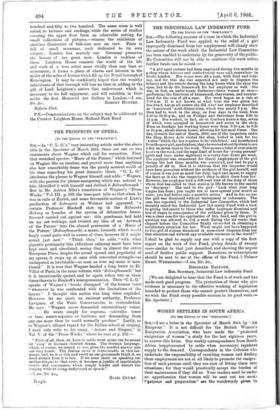THE PROSPECTS OF OPERA.
[T9 THE EDITOR OF THE " SPEOTATQR:] Stu,—In "C. L. G.'s" very interesting article under the above title in the Spectator of March 24th, there are one or two statements about Wagner which call for correction. First, that wretched spectre, "Music of the Future," which fastened on Wagner like an incubus, and proved more than anything else how remarkably dense was the purely musical world of his time regarding his great dramatic ideals. "C. L. G." attributes the phrase to Wagner himself, and adds : "Wagner, with the passion for phrase-mongering which was natural to him. identified it with himself and dubbed it Zukunftsmusik." But in Mr. Ashton Ellis's translation of Wagner's "Prose Works," Vol. III., p. 103, the tone-poet tells us that when he was in exile at Zurich, and some favourable notices of Liszt's production of Lohengrin at Weimar had appeared, a certain Professor Bischoff shot - up in the Kolnische Zeitung as founder of the system of defamation hence- forward carried out against me: this gentleman laid hold on any art writings, and twisted my idea of an Artwork of the Future' into the absurd pretension of a 'Music of the Future' (Zukunftsmusik), a music, forsooth, which would haply sound quite well in course of time, however ill it might sound just now." "Think then," he adds, "with what gigantic pertinacity this ridiculous calumny must have been kept erect and circulated, seeing that in almost the entire European Press, despite the actual spread and popularity of my operas, it crops up at once with renovated strength—as undisputed as irrefutable—so soon as ever my name is men- tioned." It is true that Wagner headed a long letter to Fr. Villot of Paris, in the same volume, with "ZukunftEnnusik," but it is intentionally quoted, and he again refers two or three times therein to Bischoff's misrepresentation. Then "C. L. G." speaks of Wagner's "heroic disregard" of the human voice "whenever he was confronted with the limitations of the larynx." I thought this notion was long since exploded. However, let me quote an eminent authority, Professor Lavignac, of the Paris Conservatoire, in contradiction. He says: "Wagner never demanded extraordinary voices. He wrote simply for soprano, contralto, tenor or bass, mezzo-soprano or baritone, not demanding from any one more than he could normally produce." Lastly, as to Wagner's alleged regard for the Italian school of singing, I need only refer to his essay, "Actors and Singers," in Vol. V. of the "Prose Works," where he says at p. 202 :— "First of all, then, we have to settle what alone can be meant by ' song ' in German chanted drama. The German language. whieh, ot course, we intend to use, gives the needful answer into our very hands. The Italian canto is inexecutable in this lan- guage, and, be it as rich and sweet as our gourmands think it, we must abstain from it in foto. If we must insist on speaking our mother-tongue to that canto, it becomes a jumble of inarticulate vowels and consonants, which simply hinder and distort the singing without being understood as speech."
—I am, Sir, &a.,
' Temple. Bssn. Citumr.






































 Previous page
Previous page